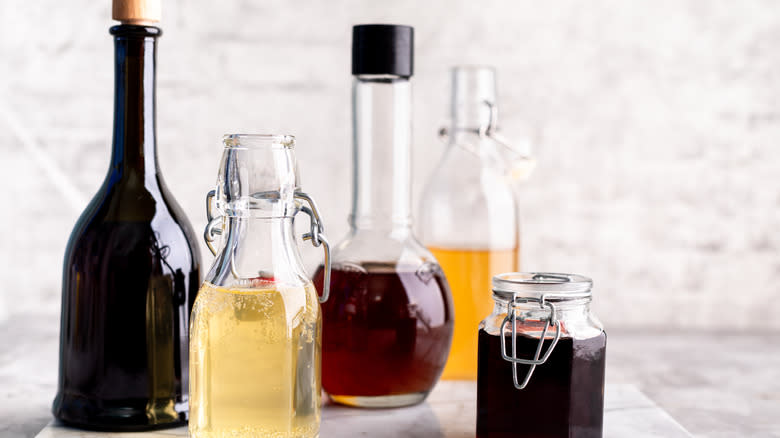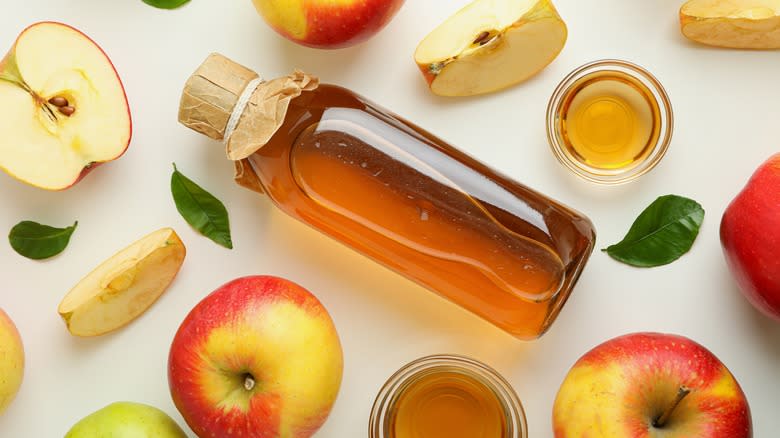Ina Garten Stores Her Vinegar In A Controversial Area Of The Kitchen

There's something satisfying about getting a peek at the home kitchens of our favorite foodie stars. We all want to know everything from how celebrity chefs really keep their kitchens spotless, to what staples they keep in their own fridges, freezers, cabinets, and pantries. When Food & Wine spoke with Ina Garten about what must-have ingredients she makes sure to always stock up on, she shared the fact that she always keeps multiple types of vinegar in her fridge.
If that made you do a double-take, you're not alone. While there are more than a dozen different types of vinegar with unique properties and uses, many people tend to keep those different vinegars in their pantry or — if they're used frequently — in a kitchen cabinet. In the fridge? Not so much.
But there's no denying that Ina Garten is a bit of a legend, so is it possible that she knows something that the rest of us don't? Perhaps, perhaps not: While she insists that there's no better place for vinegar, don't go rearranging and making space for your favorite vinegars just yet.
Read more: French Cooking Tricks You Need In Your Life
What Does Ina Garten Have To Say About Her Vinegar?

In 2020, Food & Wine was chatting with Ina Garten around the release of her cookbook, "Modern Comfort Food." She shared that not only was she a fan of having multiple kinds of vinegar on hand and ready for use, but she also explained that "For anything I'm making, if it has like a little splash of vinegar, it just gives it an edge and wakes everything up."
She's absolutely right, and vinegar has such a wide range of uses that it's pretty much a super ingredient. A splash of vinegar will add a punchy kick to your homemade sausage, it can be used to keep your cheese fresh, and you can even use vinegar to help prevent overcooking potatoes. Vinegar's great to keep on hand, but why does she keep her various bottles of vinegar in the fridge?
"I know a lot of people keep them in the pantry. I might take hell for this, but I just find that they don't develop bacteria in the fridge," she said. Adulthood is basically one long experience of finding new things to worry about, but should you be concerned about bacteria developing in your vinegar? If you've heard that it's one food that doesn't go bad, that's correct — so let's take a closer look at her claim.
Does Vinegar Develop Bacteria, And Where Should You Be Storing It?

First things first: Multiple sources confirm that no, vinegar does not spoil and in fact, it has an almost infinite shelf life. That's because of the same high acidity that makes it perfect for applications like pickling and preservation, and if you're wondering why it has an expiration date, that's a great question. In a nutshell, that's more of a best-by date. Although expired vinegar might not have quite the same flavor or pickling potency that you've come to know and love, it's still safe. And perhaps more importantly, it's still shelf-stable, which means that it doesn't need to be refrigerated.
What about Ina Garten's claim that vinegar can start to harbor bacterial growth? For starters, vinegar has antibacterial properties, which is why it's so often lauded as an all-natural cleaner and sanitizer. That makes it unlikely that a bottle can develop a bacterial infection, but that doesn't mean it's unheard of.
Some kinds of bacteria can actually start to grow in vinegar, and it'll appear as cloudy-looking sediment. There's good news, though: It's harmless, and you can definitely just strain the vinegar to remove it and return it back to the shelf. That's right — shelf, not refrigerator. As long as it's stored in a cool, dark place with the lid firmly in place, it'll be fine.
Read the original article on The Daily Meal.


